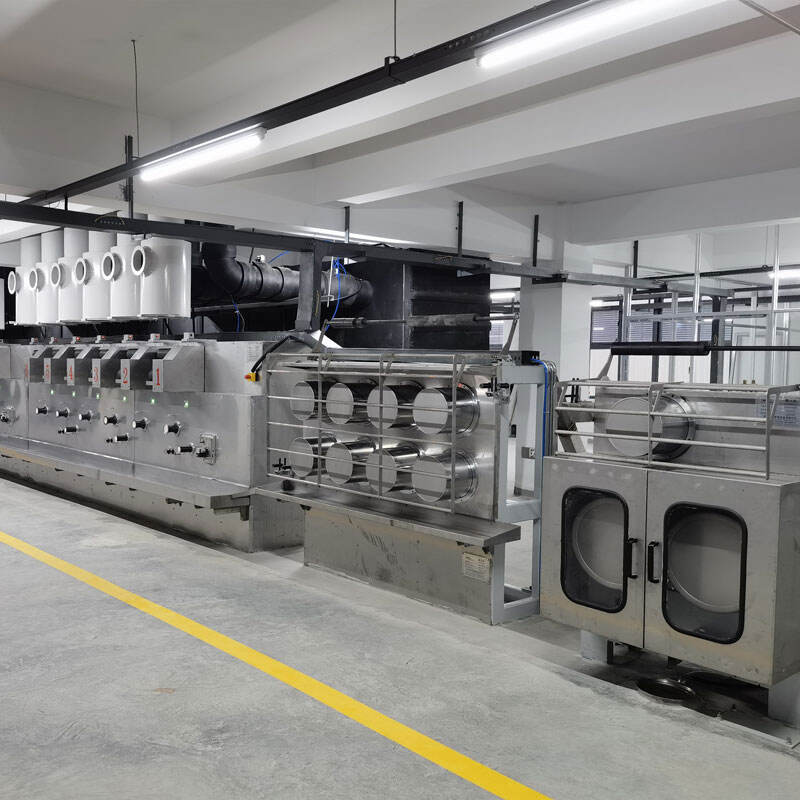Progress in polyester production technology continues to reflect the industry’s need for improved efficiency, quality, and environmental compliance. The ongoing technological advancements improve not only polyester manufacturing processes, but also help businesses adjust to shifting market demands and global goals for sustainability. As an advanced industrial solutions provider, Shenzhen Softgem Technology Co Ltd tracks these technological advancements and integrates state-of-the-art technology into polyester machine systems to advance the polyester industry. From smart tracking systems to efficiency boosting solutions, these are the most important advancements in polyester machine technology.
Adding the Internet of Things to the polyestercasting machine is a remarkable advancement. Traditionally, polyestercasting machines had to rely on human attention for inspections to monitor production parameters. This is obviously overdue, with human-caused lag and errors. Now modern polyestercasting machines have been equipped with multiple real time data collection sensors over parameters like melting temperature, cooling efficiency, filament cooling, and extrusion speed parameters. It is all sent to a central control and operating system to oversee the entire polyestercasting machine remotely. For instance, if the system’s sensors on the melting section of the polyestercasting machine detect abnormal high to polyestercasting machine, the system trigger alerts and suggests corrective action to avoid material waste and defective products. Advanced polyestercasting machine offers the manufacturer a production stacking with marginal polyestercasting machines in the production stream due to the historical data. Overall, this is a brilliant way to enhance the reliability and dependability of the machine while lowering the the manual workload involved.

AI technology has revolutionated the polyester industry with the ability to implement adaptive controls that surpass traditional tuning methods. AI enabled polyester machines analyzes historical production data along with real time data to automatically fine-tune the machine settings for different raw materials and end product specifications. For example, while recycling PET chips and converting them to polyester fibers, the polyester machine AI system dynamically controls the melting temperature and extrusion speed for uniformly strong and consistently thick fibers. This adaptive control minimizes human error since the machine's AI responds to raw material and environmental changes more swiftly than a human. Furthermore, AI technology supports Predictive Maintenance for polyester machines. It analyzes the data to assees the wear and tear of the machine, identifies operational patterns, predicts breaks and warns the maintenance crew about issues like worn extrusion nozzles before they arise. This approach helps to reduce unplanned machine downtime and extend the machine service life.
There is an increasing need for polyester machines to focus on sustainability because of tightening environmental regulations and lower carbon footprints demanded by manufacturers. One prominent innovation in energy-saving environmental sustainability practices for polyester machines is the introduction of heat recovery systems. These systems save 20-30% of energy by reusing waste heat generated during the melting and drying stages of the polyester machines to preheat the raw materials and heat the production workshops. The introduction of high-efficiency electric motors and frequency converters in polyester machines for conveyors and fans is also an innovation. Advanced polyester machine models that process high percentages of waste PET bottles and other recycled materials into premium polyester products also divert plastic waste from landfills. This innovation reduces plastic waste and lowers the reliance on virgin resources. Eco-friendly polyester machines are energy-efficient and meet international standards. Optimized models from Softgem help businesses achieve an eco-friendly balance on production goals.

With the rising demand for polyester products, the key focus has shifted towards the advancement of high-speed and high-capacity polyester machine technologies. Traditionally, the polyester machine has had limitations in production speed due to the constraints of the spinning, drawing, and winding processes. Modern polyester machines have addressed this issue with new extrusion heads and advanced high-speed drawing machines. For instance, advanced polyester machines have the capability of spinning polyester fibres at 800-1000 meters per minute. This is 50-60% faster than older models, which dramatically increases the production pace. This increase in speed translates to the daily production polyester machine production capacity reaching hundreds of tons instead of the previous tens of tons. This allows the manufacturers to increase production efficiently. Furthermore, polyester machines have modular and feeding and winding systems designed to allow continuous production, which limits the amount of production stops for material replacement. This advance increases production efficiency which reduces the overall unit cost of polyester products. This significantly increases the competitiveness of the end manufacturers.
Advancements in polyester machinery technology take great strides in improving the quality and consistency in polyester products. One important advancement is the addition of inline quality control in polyester machines. These control systems use high-resolution cameras and laser sensors to detect faults like uneven fibre thickness or contamination in real time. Defective products are automatically rejected, or the systems adjust and optimize inline processes to correct the issue. This guarantees production of high quality polyester products. The innovations in the building of multi-functional production modules in polyester machinery assist in polyester products with special and specific properties. Instead of replacing entire components, the module settings can be changed. For instance, one machine can quickly switch from producing fine polyester fibres for textiles to coarse polyester fibres for non-woven materials. This not only enhances product range but also quality in varying polyester products, thus, satisfying the different needs of the downstream users.
 Hot News
Hot News2024-07-25
2024-07-25
2024-07-25